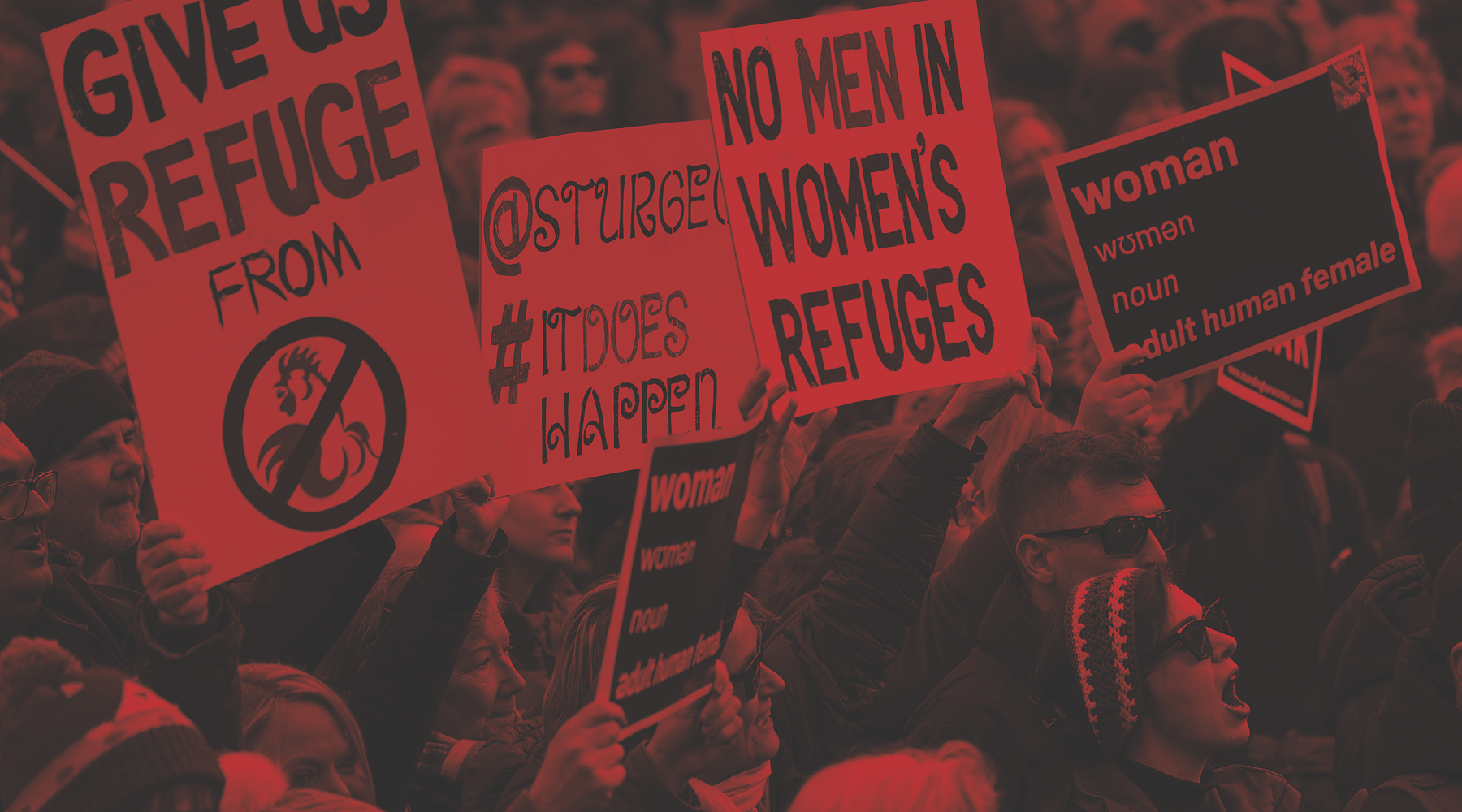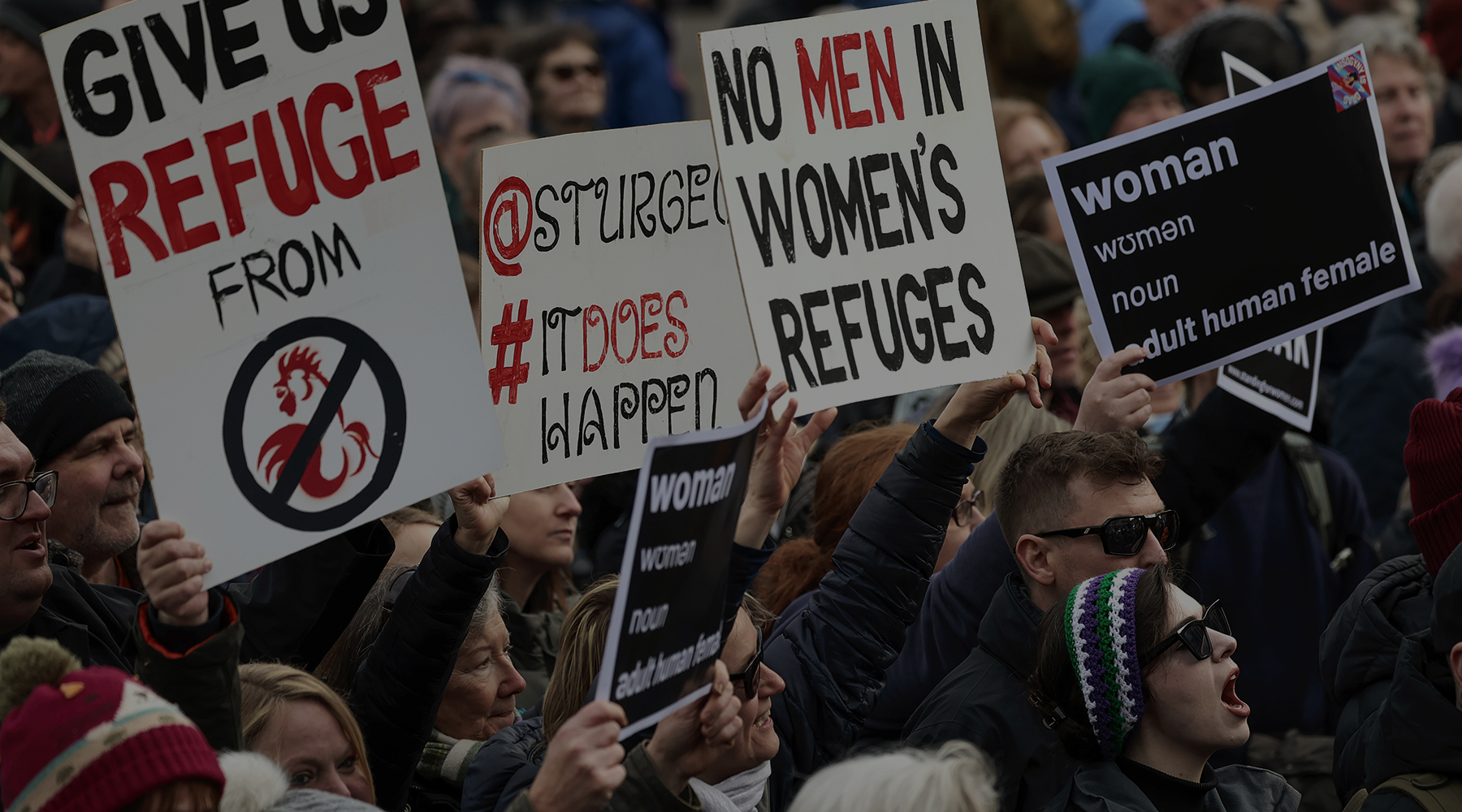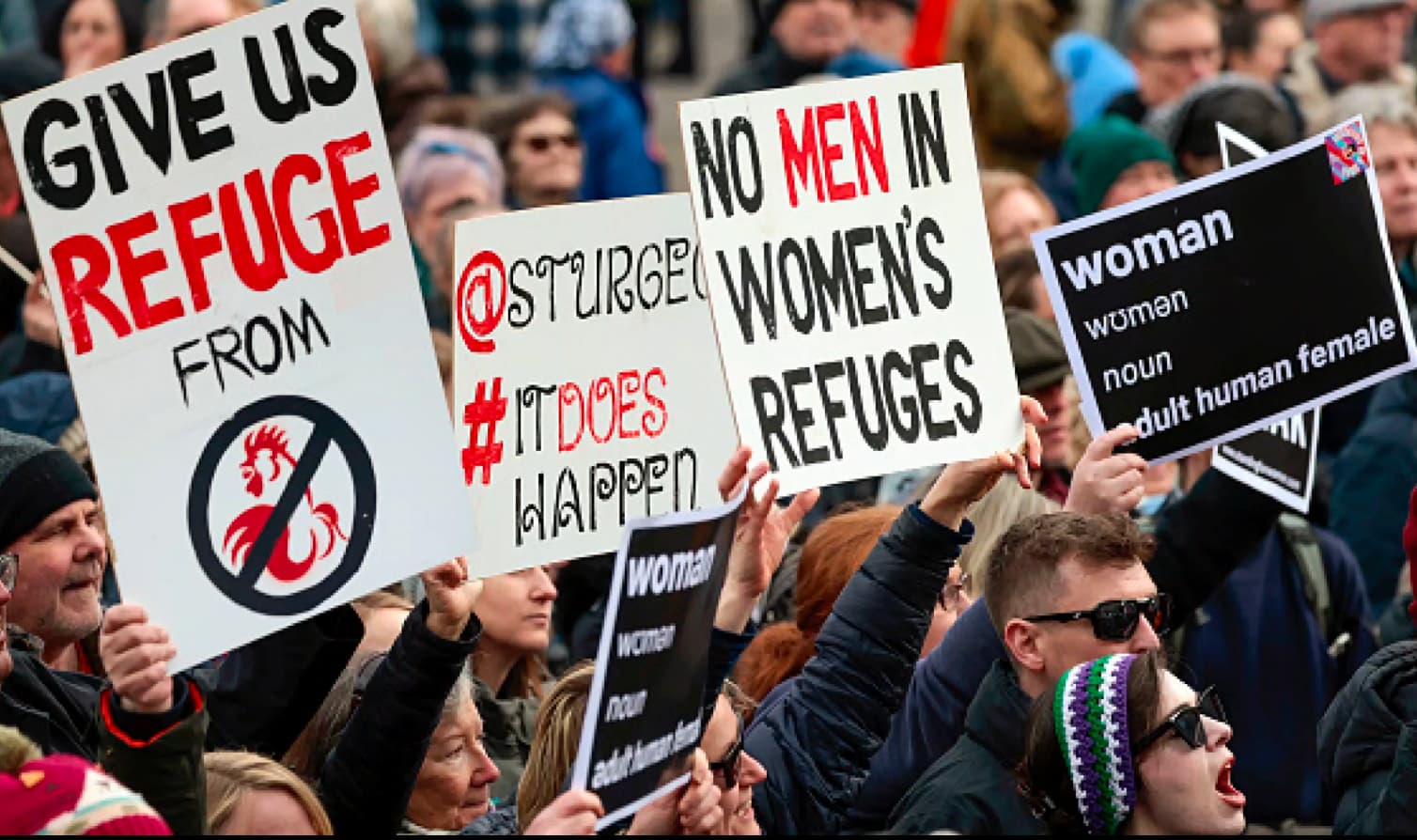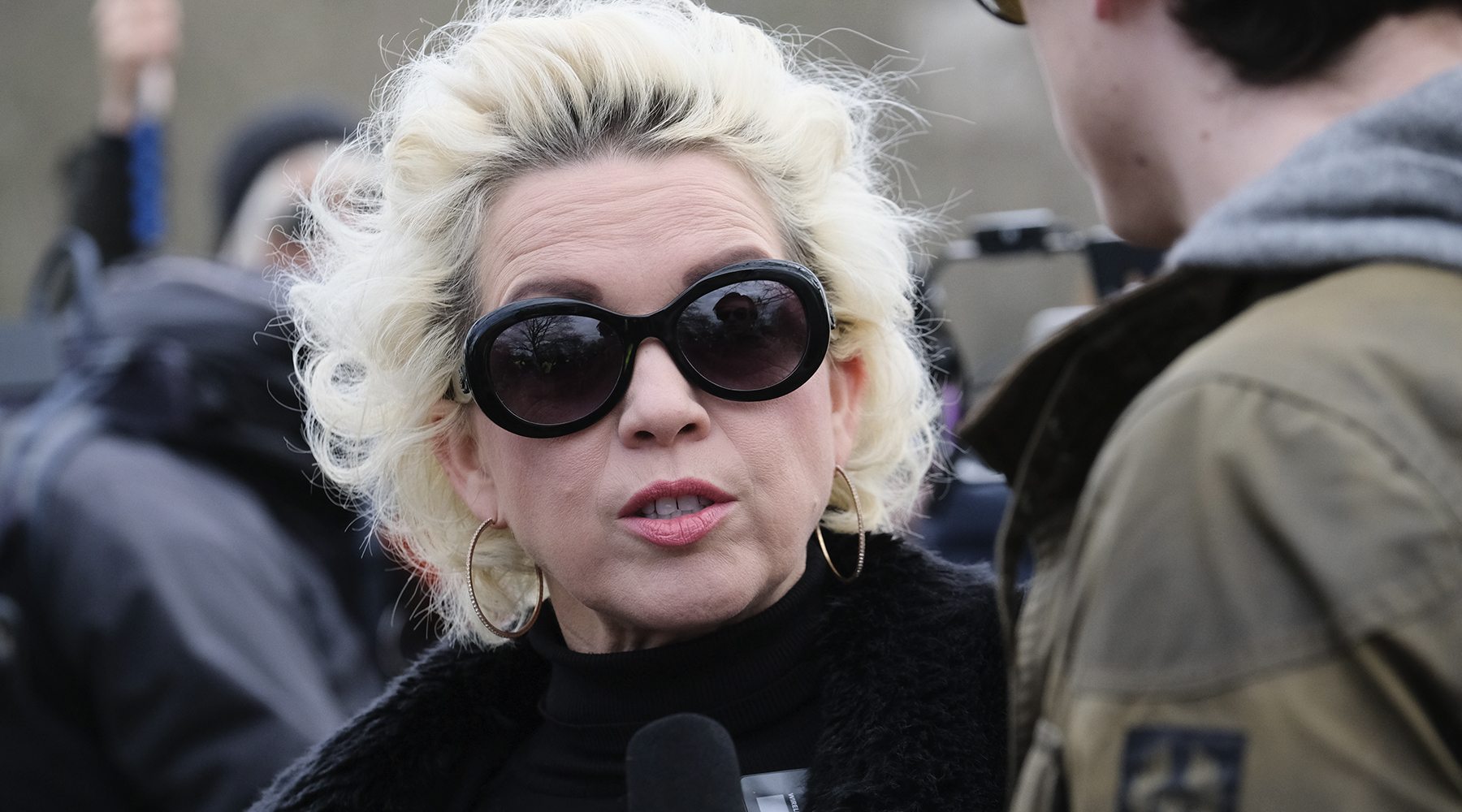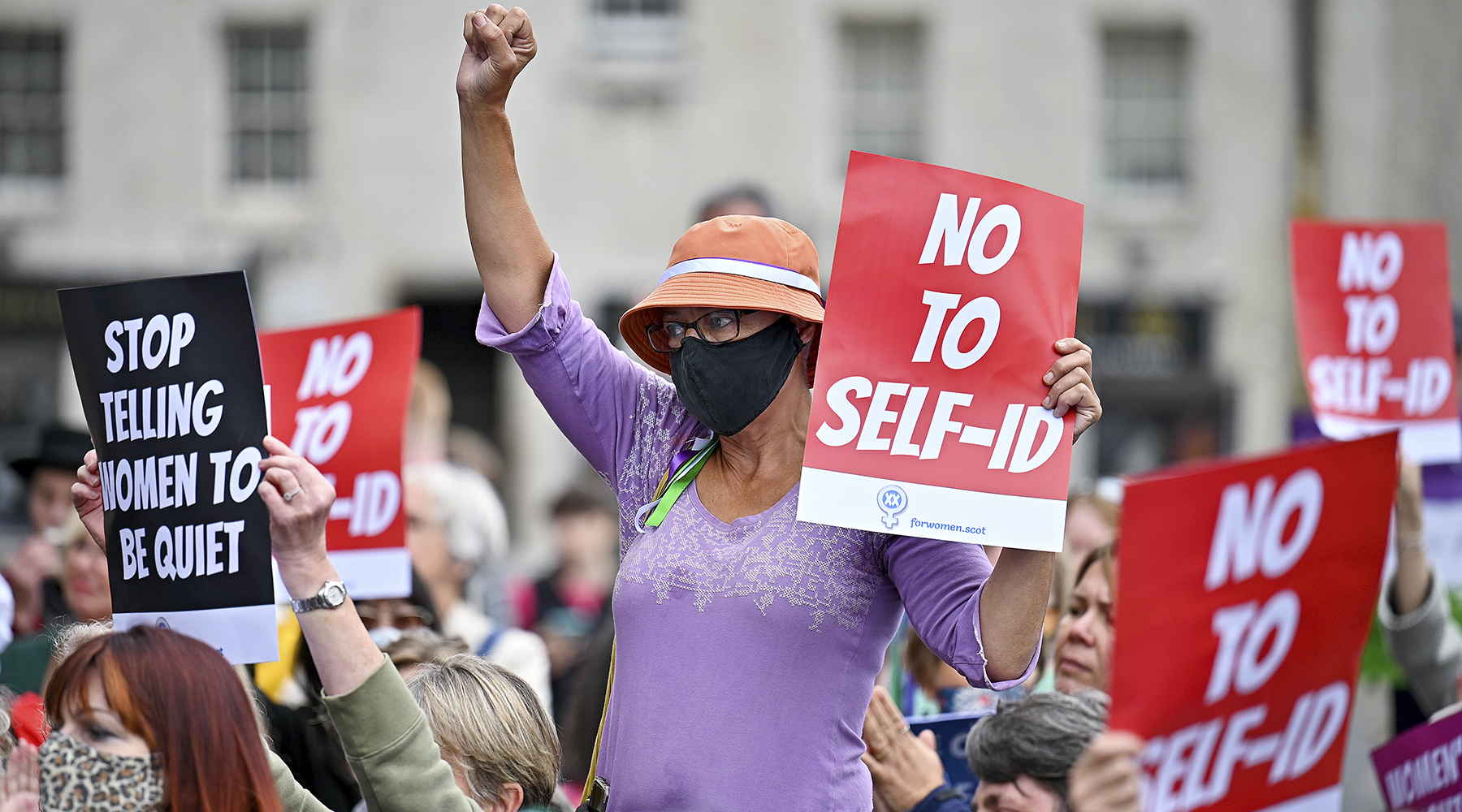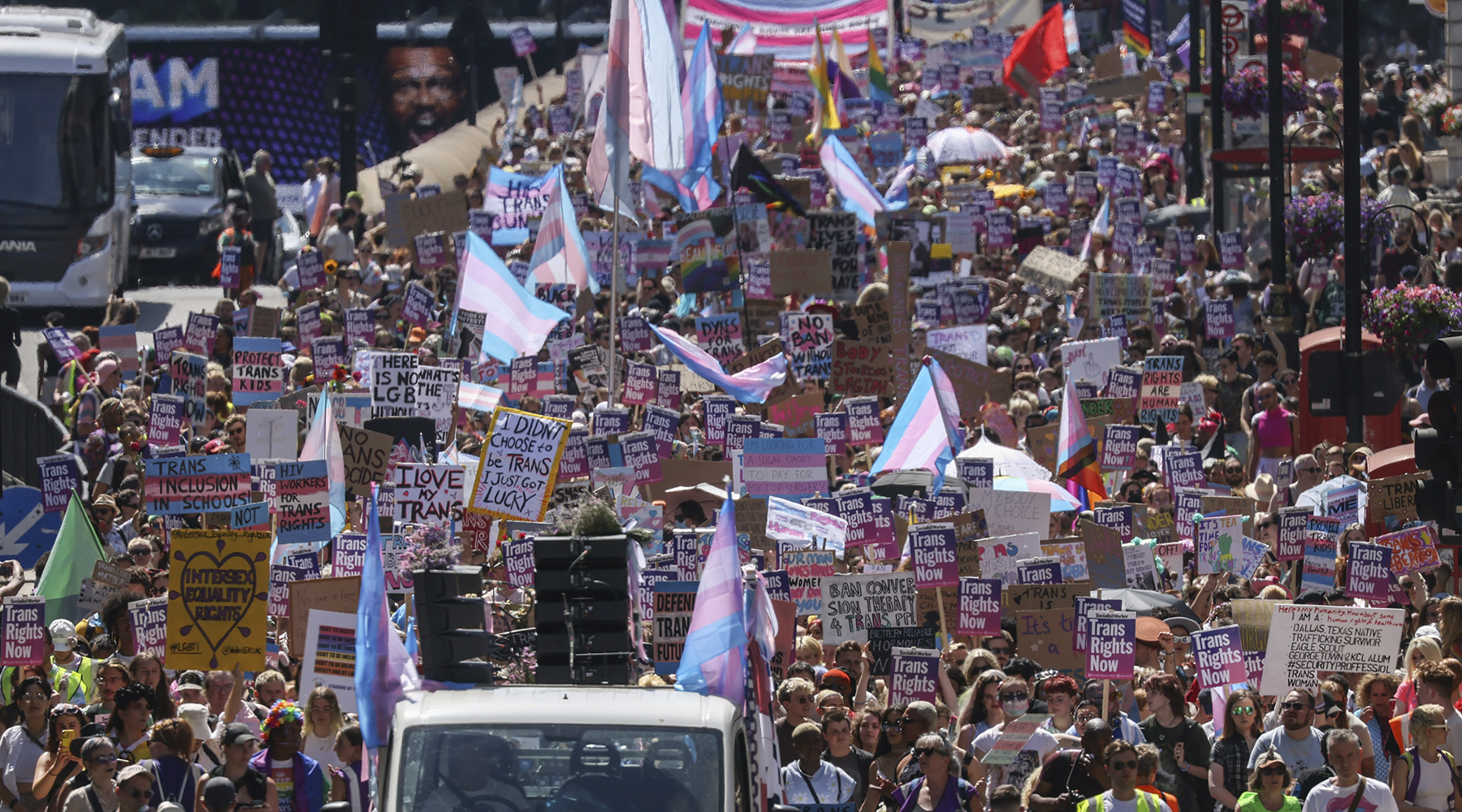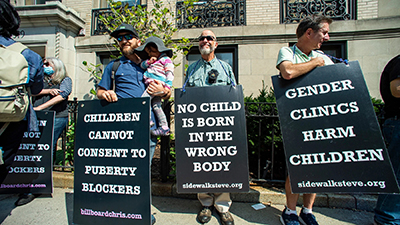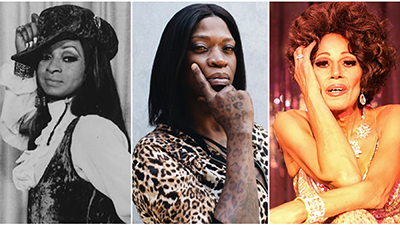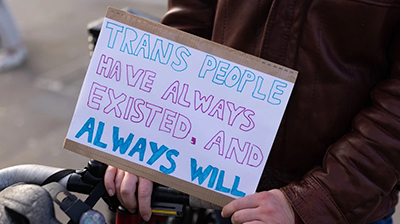If you read the news, it’s easy to think that gender-critical thinking is the dominant mode of British feminism. That can be terrifying for trans and non-binary people, especially when we are increasingly bombarded with transphobic headlines; an IPSO report in 2020 found there had been a 400 percent increase in coverage of trans issues in the previous five years.
What’s scarier is that this has translated into political power. “Because these gender-critical feminists are in such positions within the media or political parties, they in some way represent mainstream feminism to people, which is really sad,” Phipps explains. “And [gender-critical ideology] has a powerful influence on policy, because of the platforms and connections they have, and the alliance they have made with various right-wing or reactionary politicians.”
TSN observes that “the encouragement and cooperation of right-wing politicians and newspapers” supports the harassment of pro-trans groups that is “typically perpetrated by self-described gender-critical feminists”. In July 2020, anti-trans feminists on Mumsnet orchestrated an online campaign against two trans-inclusive rape-crisis centres, according to TSN. Subsequently, Conservative politicians Jackie Doyle-Price and Baroness Emma Nicholson – who both oppose gay marriage – condemned the centres in a Daily Mail interview.
But away from the media, the “vast majority” of cis woman who use domestic and sexual violence services are supportive of trans women having access to them, according to research from Newcastle University into trans inclusion in abuse support services.
Dr Natacha Kennedy, a Goldsmiths lecturer and co-chair of the Feminist Gender Equality Network, argues that the mainstream influence of gender-critical ideology is “very much [down to] a right-wing media campaign”.
“Viktor Orbán in Hungary used trans people as a wedge issue to drive his country into the arms of the far right,” she says. “That’s what’s happening here. And the gender criticals hate trans people so much that they are prepared to go along with this… Either that, or they are actually quite right-wing and bigoted themselves.”
Gender-critical activists within the British media have written extensively for the right-wing press, like the Times, Telegraph and Daily Mail. Left-wing gender-critical writers have crossed political lines, writing for publications whose editorial stance on other issues – like immigration, public services or women’s rights – appears out of sync with their own views. Through doing this, they’ve helped catapult gender-critical talking points into the public eye.
Grace Lavery, associate professor of English at University of California, Berkeley, and author of Please Miss: A Heartbreaking Work of Staggering Penis, says their success in doing so is down to “reducing their account of the world to slogans that seem self-evident”, like “Woman – adult human female.”
“It’s a very authoritative, powerful-sounding rhetorical soundbite,” Lavery says. But the media’s portrayal of gender-critical activists as powerful within British feminism and LGBTQ+ communities is a false one, Lavery says she learned when she visited the UK last year on her book tour.
From her perspective in the US, it seemed that “an extraordinarily large and organised anti-trans movement” that ”presents itself as feminist” had formed in the UK, with the power to “split the Labour Party down the middle, to detonate LGBTQ+ organisations like Stonewall”.
But after visiting more than a dozen towns and cities up and down the UK, Lavery says what she found was “profoundly different”, and that the trip “radically changed” her views on the UK’s gender critical movement. “I don’t any longer believe it is true to say that the UK is dominated by TERFs,” she says. “Individual organisations and institutions have been infiltrated, but the fear I had, which was that there was coming into being a centre-left anti-trans alliance, I don’t think it is happening.”
“In other words the LGB Alliance, which was set up with great hurrah and fanfare by the media, has failed to split the LGBTQ+ movement,” she says. “I think that’s notable and really remarkable.”
It’s not only the LGBTQ+ movement that gender-critical activists have failed to win over. Unison, the UK’s largest trade union, unanimously voted in 2022 to support trans rights in local councils, providing members with training and resources to tackle gender-critical narratives and shed light on their links to the far right. This followed similar moves from other trade unions, including the British Medical Association, which strongly backed self-ID and healthcare for trans under-18s amid the debate about GRA reform.
Gender-critical feminists may have the powers that be and the far-right, but they haven’t persuaded other feminists. There are “so many fantastic feminists doing brilliant work to tackle gender-based violence, share resources or mobilise people” in the UK at the moment, “who do centre trans people”, Falodun-Liburd says.
“The conversation shouldn’t be about whether or not trans women should be in a women’s prison,” she adds. “No women should be in prison. Let’s start there.”
This abolitionist view is becoming much more widespread within British feminism. In 2021, Phipps co-convened a collective of academics who want to learn from grassroots feminist groups, called Abolition Feminism for Ending Sexual Violence. “I see a shift in the violence against women and girls sector towards more anti-carceral approaches, and definitely towards trans inclusion,” Phipps says. “But it's quite scary to come out as a trans-inclusive service, obviously, because people are getting sued.”
On International Women’s Day this year, Labour MP Jess Phillips read out, as she does annually, a list of names of women killed by men in the preceding year. Phillips included Brianna Ghey, a trans girl who was killed in February, to the immediate fury of gender-critical feminists. On social media, replies to a video of Phillips’ speech were filled with transphobia, as she was accused of disrespecting women for honouring a trans girl. “You should be ashamed,” Phillips was told.
A few days after neo-Nazis paraded through Melbourne, Keen-Minshull was in the Tasmanian capital, Hobart. By this point, footage from Let Women Speak rallies showed counterprotesters being manhandled by security, including one person who was grabbed by the throat while attempting to seize the microphone. Parker herself and her supporters, it transpired, were the only women she wanted to hear speaking.
“Why do you stand with Nazis though?” someone asked Keen-Minshull at the Hobart rally. A video showed her response: “Why don’t you go away?” Keen-Minshull shouted, crossing her arms. “I’m not a feminist! Go away.”
Women and queer people Down Under made it abundantly clear that Keen-Minshull does not speak for them. And, while gender-critical feminists may be of interest to the far right, within British feminism itself – and in gay, lesbian and bisexual communities – gender-critical feminists are, Phipps says, “just a very loud, very annoying minority”.
“They are not taken remotely seriously. In the feminist spaces I circulate in, which are more intersectional, more abolitionist, gender-critical ideology doesn’t have any influence,” she says. “It’s not relevant to the work we’re doing, because it’s so clear now how reactionary their agenda is.”
British gender-critical activism briefly took the world stage during Keen-Minshull’s tour. But while gender-critical activists back in the UK may gloss over the fact that their ideology attracts Nazis, it will be harder for them to shrug off how little enthusiasm many women have for it. Even with the far-right boosting the numbers at her Melbourne rally, Keen-Minshull’s supporters were reportedly outnumbered two to one by anti-fascist and pro-trans counter-protestors. “Posie Parker you can’t hide,” they chanted. “You’ve got Nazis on your side.”
